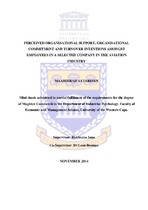Perceived organisational support, organisational commitment and turnover intentions amongst employees in a selected company in the aviation industry
Abstract
A large body of research on staff turnover report that intention to leave the organisation is one of the key predictor’s to staff turnover (Chen & Francesco, 2003; Steel & Lounsbury, 2009). Researchers agree that when organisational commitment is high amongst staff the result is low turnover (Abdulkadir & Orkan, 2009; Culpepper, 2011; Muse & Stamper, 2007; Rhoades & Eisenberger, 2002). A strong correlation between voluntary turnover and the three organisational commitment dimensions (namely, affective, continuance and normative) was also found (Tansky & Cohen, 2001; Ucar & Otten, 2010). Organisational commitment has been identified as an important employee job related behaviour and perceived organisational support plays a vital role in enhancing employees’ organisational commitment. As employees’ commitment increases, employees feel more obligated and committed towards their organisation and products of this increased commitment are favourable benefits such as organisational effectiveness, reduced turnover, improved performance and reduced absenteeism (Yang, Wu, Chang, & Chien, 2011). The purpose of this study was to identify the relationship between perceived organisational support, organisational commitment and turnover intentions. Convenience sampling was used to identify the sample and questionnaires were used to collect the data. The questionnaires used to gain information include a biographical questionnaire; Eisenberger et al.’s Survey of Perceived Organisational Support, Meyer and Allen’s Organisational Commitment Questionnaire and Roodt’s Turnover Intentions Questionnaire. These questionnaires were administered to individuals employed as load control agents and support staff at a selected company in the aviation industry. The data was analysed using SPSS version 22. The results of the study reveal that no statistically significant relationship exists between perceived organisational support and turnover intentions amongst employees, however a statistically significant relationship between organisational commitment and its various dimensions namely, affective, continuance and normative commitment was found with turnover intentions. Furthermore, a statistically significant relationship between perceived organisational support and organisational commitment and its various dimensions namely, affective, continuous and normative commitment was also found. In addition to this both perceived organisational support and organisational commitment were found to predict turnover intentions. However, organisational commitment was found to be a stronger predictor of turnover intentions than perceived organisational support. Furthermore, when exploring the dimensions of organisational commitment and turnover intentions, normative commitment was found to be the strongest predictor of turnover intentions. Limitations of the findings are presented and possible recommendations for the organisation and future research are also provided.

